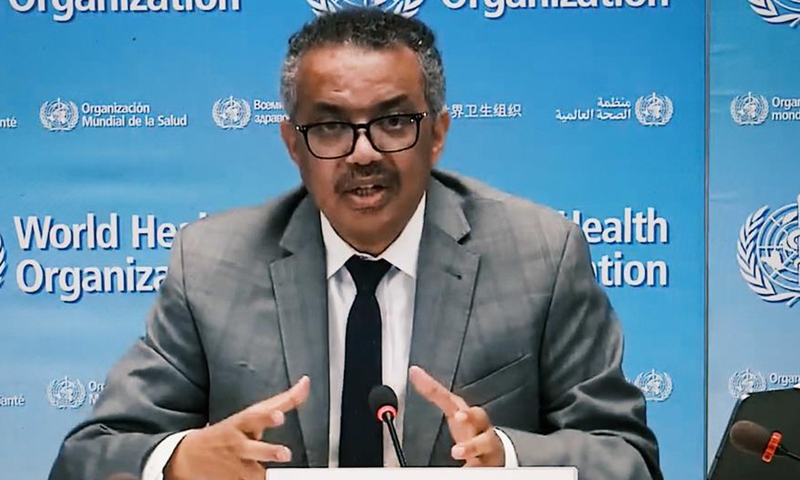Letting virus ‘run free’ with eye to herd immunity ‘unethical’: WHO
Source: AFP Published: 2020/10/13 18:28:41

Photo taken in Brussels, Belgium on Aug. 6, 2020 shows World Health Organization (WHO) Director-General Tedros Adhanom Ghebreyesus attending an online press conference held in Geneva, Switzerland. The COVID-19 death toll worldwide has surpassed 700,000, reaching 701,754 as of Thursday, according to the latest number from the WHO. (Xinhua/Zhang Cheng)
The World Health Organization chief warned Monday against just allowing the novel coronavirus to spread in the hope of achieving so-called herd immunity, saying it was "unethical."
Tedros Adhanom Ghebreyesus cautioned against calls in some countries to let COVID-19 run its course until enough people develop the immunity needed to naturally halt its spread.
"Herd immunity is a concept used for vaccination, in which a population can be protected from a certain virus if a threshold of vaccination is reached," he pointed out during a virtual press briefing.
For measles, for instance, it is estimated that if 95 percent of the population is vaccinated, the remaining 5 percent will also be protected from the spread of the virus.
For polio, the threshold is estimated at 80 percent.
"Herd immunity is achieved by protecting people from a virus, not by exposing them to it," Tedros said.
"Never in the history of public health has herd immunity been used as a strategy for responding to an outbreak, let alone a pandemic," he insisted.
The novel coronavirus has killed well over 1 million people and infected more than 37.5 million since it first reported late in 2019.
Relying on naturally obtaining herd immunity in such a situation would be "scientifically and ethically problematic," Tedros said.
"Allowing a dangerous virus that we don't fully understand to run free is simply unethical. It's not an option."
He pointed to the lack of information on the development of immunity to COVID-19, including how strong the immune response is and how long antibodies remain in the body.
Tedros pointed to some cases where people are believed to have been infected with the virus a second time.
He also stressed the many long-term health problems of infection, which researchers are only just beginning to understand.
And Tedros pointed out that it has been estimated that less than 10 percent of the population in most countries are believed to have contracted the novel coronavirus.
AFP
Posted in: CROSS-BORDERS,WORLD FOCUS